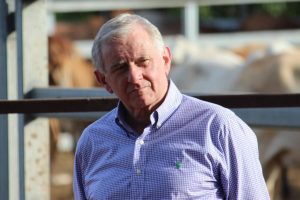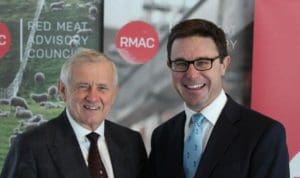
ALEC chairman Simon Crean.
DRAFT heat stress assessment proposals for live sheep exports will end the trade, risk cattle shipments and have implications for onshore livestock production if adopted, Australia’s Minister for Agriculture David Littleproud has been told today.
In a letter released today, Australian Livestock Exporters’ Council chairman Simon Crean has hit back at recent criticism from Mr Littleproud, including his demand for exporters to give a timeline for installation of new technology to ease heat stress on live export vessels.
A Heat Stress Risk Assessment panel has recommended a wet bulb temperature welfare limit for 56kg live export Merino wethers of 28°Celsius, with a 98 percent probability that the deck temperatures the sheep would be exposed to would remain below the WBT welfare limit. The Department of Agriculture and Water Resources has suggested live Merino sheep exports from Australia during the hottest months of the year in the northern hemisphere (May to October) may not meet the WBT animal welfare criterion and the proposed heat stress risk assessment recommendations might lead to “a cessation of trade during this period.”
Mr Littleproud earlier this week said the exporting industry did the science which helped create the heat stress model, but had not done the work on the solution. He said exporters had “made millions” in the trade and the “opportunity is here to invest for the future.” The minister also expressed concern ALEC and members had not acted on research five years ago showing public attitudes against the industry were at crisis point and true transparency and animal welfare indicators were urgently needed.
Heat stress proposals have “implications for domestic sheep production”
In his letter to Mr Littleproud, Mr Crean said the draft heat stress recommendations will render the trade unsustainable.
“The draft recommendations contained in this report, if adopted, will result in the end of the live sheep trade, with the potential for severe contagion to cattle.”
Mr Crean said a closure of the sheep trade, as a result of the panel’s report, will have an enormous impact on producers, particularly those in Western Australia, a source of extreme concern to ALEC.
“Of equal concern is that new animal welfare benchmarks in the report, which are unprecedented globally in terms of their requirements, will have implications over time for domestic sheep production practices and management of both heat stress and cold stress – standards cannot be introduced in one section of the supply chain without implications for all sections when root causes are the same.”
Mr Crean said the draft recommendations effectively require no sheep to pant at score 3 or above, a score exhibited by sheep under certain conditions in Australia.
“The report also vastly lowers the targeted threshold from a mortality basis to one based on pant score.
“A normal response when a targeted threshold is lowered is to increase the risk setting (since the impact of not meeting the threshold is less severe – in this case, the risk involves avoiding animals panting at score 3 rather than unrecoverable event in both heat and duration),” he said.
“However, the HSRA Technical Panel has not only substantially lowered the threshold but also the risk setting.
“The end result is a threshold / risk setting that is impossible to meet,” Mr Crean writes.
“The Panel seems to have ignored evidence, including from AAV reports, and those from Independent Observers, that for a large part of the year sheep on voyages to the Middle East suffer no overwhelming serious discomfort at wet bulb temperatures of 28 degrees.”
Concern that wet bulb temperature proposals will affect cattle

PGA president Tony Seabrook.
Pastoralists and Graziers Association president Tony Seabrook is also concerned implementation of the heat stress recommendations “will basically mean the end of the live sheep trade as we know it.”
“And I’ve spoken to some cattle producers and our understanding is that they are highly likely to come under the same level of heat stress observation and this could be much bigger as an issue.
“We understand that mortality ought not to be the measure, but there is a point here where you just create so much regulation at so much cost.”
Mr Seabrook said Mr Littleproud’s comments in coming out in a “relatively negative way” in assailing exporters over reinvestment were disappointing.
“Who on earth is going to invest millions and millions of dollars when the industry is so poorly supported politically?”
Mr Seabrook said exporters had told him sheep had been loaded at Fremantle in 28°Celsius wet bulb temperature conditions.
Kimberley cattleman Peter Camp on Kalyeeda station, east of Broome, said his operation relied on the live export market, but he expected the heat stress recommendations for sheep would be “carried on” to cattle exports. Exporters expect dual cattle-sheep shipments or any cattle shipments sailing north of the equator to be the first affected if this was to occur. This could impact any bos Taurus-dairy cattle shipments to China, Japan, Taiwan, Vietnam, Pakistan or Sri Lanka, and southern feeder-slaughter cattle going to China, Japan, Vietnam, Russia, Israel and Turkey.
“It’s ludicrous, because it is just a way of getting rid of the trade by putting restrictions on it,” Mr Camp said.
He said sheep and cattle survive under higher temperatures than 28°Celsius wet bulb in the Kimberley, although they are not enclosed.
“How hard is it to have air circulation on those vessels?
“I know there has to be a standard set, but realistically industry has to be on the front foot to make sure we do our very best to improve those standards so that people who are trying to close the industry down have nowhere to go in finding fault with the industry.”
Crean lists ALEC’s live export initiatives

ALEC chairman Simon Crean, left, with Minister for Agriculture and Water Resources David Littleproud in July this year.
Mr Crean said animal welfare is the highest priority area for ALEC and its work has shown heat stress can be monitored and managed by industry. He said it is inaccurate to suggest the industry has made little voluntarily investment in research and that work underway occurred only after Awassi Express incident last year.
“Since 2013, the industry has invested heavily in animal welfare research, as well as training for industry participants both domestically and in-market, technologies that improve animal welfare, investment in new vessels and enhanced infrastructure on vessels.”
Mr Crean listed several industry initiatives, including:
Development of a set of animal welfare indicators, including technology to collect these indicators. After an extensive literature review and community research, collection of these indicators is now being trialled.
Progressing with the development of LGAP with establishment of a structure within which it could operate, engagement of an independent board and appointment of a CEO.
A mandatory code of conduct applicable to all ALEC members with severe penalties including suspension of the code is breached.
Development and endorsement by ALEC of an Ethics Committee, independent of the ALEC Board.
Support for an Inspector General for live Animal Exports.
Imposing a voluntary moratorium on live sheep shipments to the Middle East between June and August at the height of the northern hemisphere summer.
Imposing a voluntary pause in shipments of slaughter livestock to Malaysia during Korban in 2018.
Mr Crean said since Mr Littleproud’s ministerial appointment, “apart from one heated exchange”, the minister has “resisted my many attempts to engage with you, both on progress and the way forward.”
“Now in the interest of securing the viability of the trade, I am pleased that you have finally agreed to meet and discuss our reset and the way forward.
“In the light of the HSRA report we will not only be responding to it but also make a supplementary submission to the ASEL review.”
Click here to read Simon Crean’s letter to Mr Littleproud.

HAVE YOUR SAY